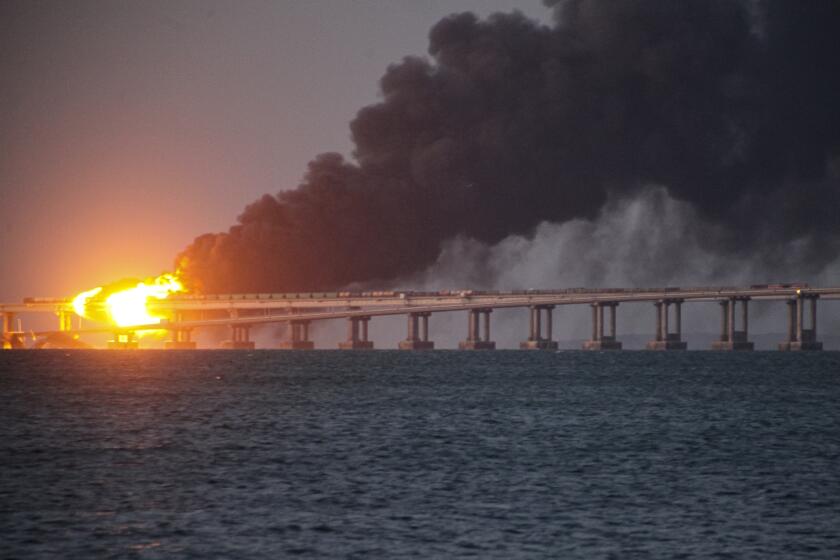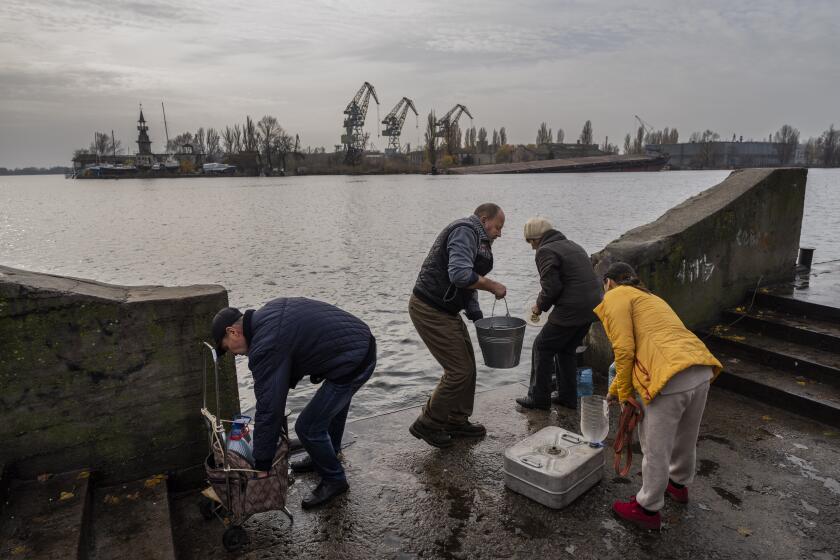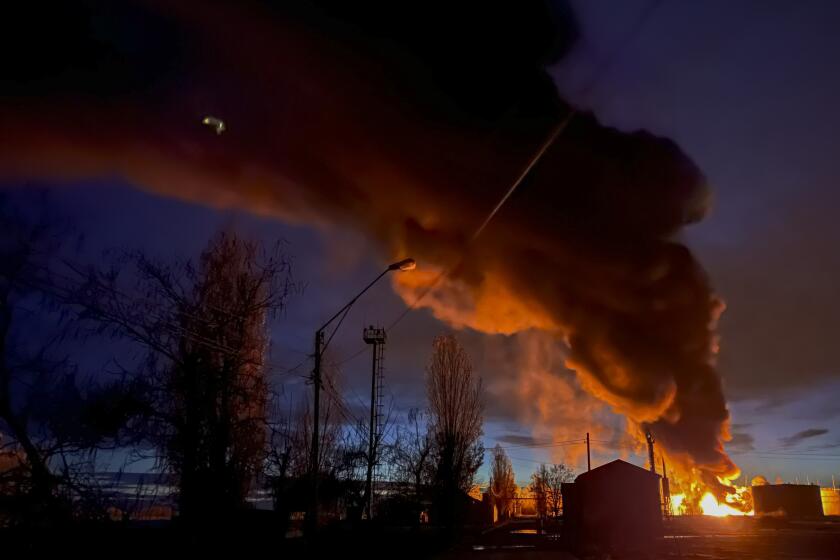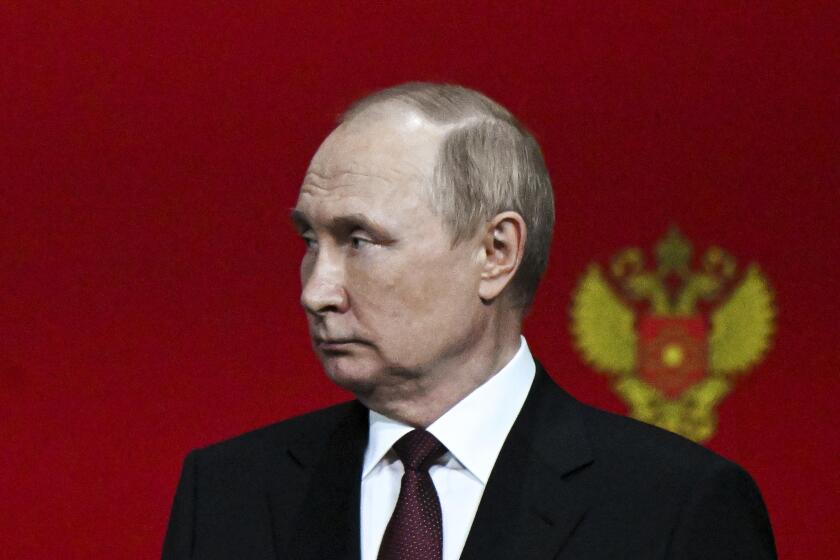Most Ukrainians are left without power after new Russian strikes
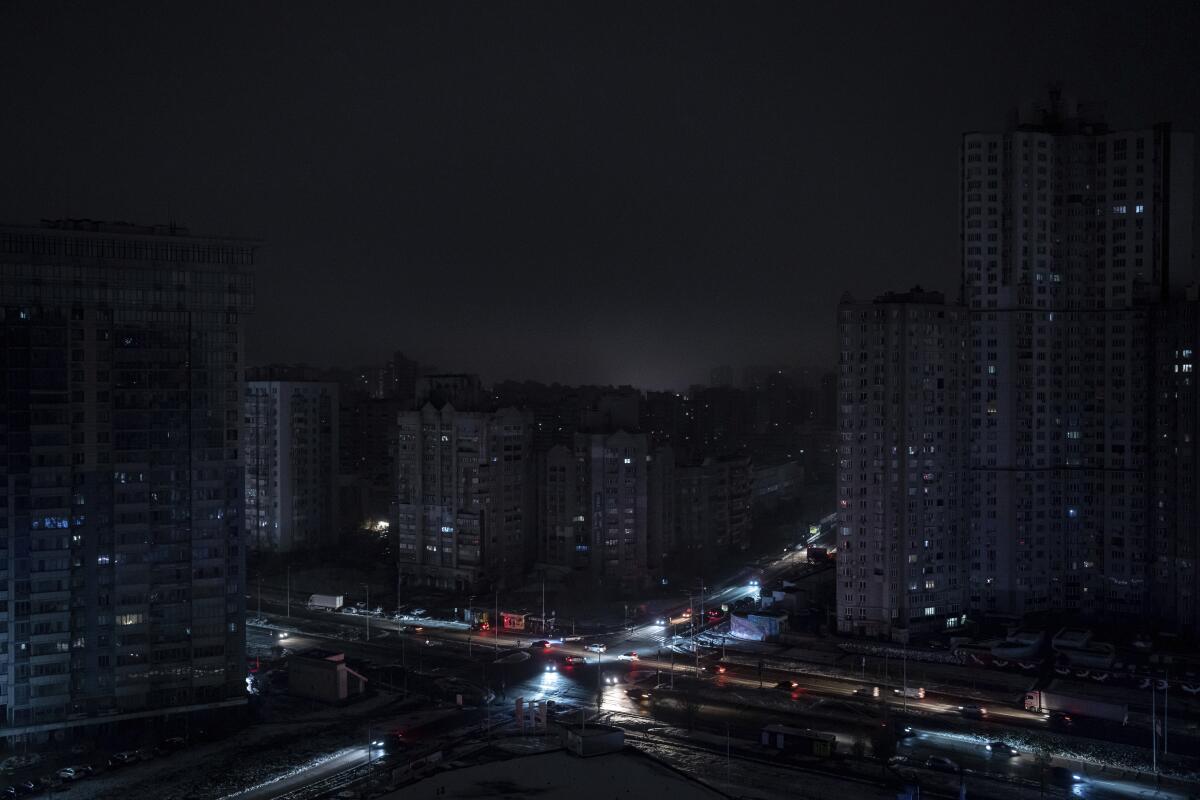
- Share via
KYIV, Ukraine — A new onslaught of Russian strikes on Ukrainian infrastructure Wednesday caused power outages across the country — and in neighboring Moldova — further hobbling Ukraine’s battered electricity network and compounding civilians’ misery as winter advances.
Multiple regions reported attacks in quick succession, and Ukraine’s Energy Ministry said that “the vast majority of electricity consumers were cut off.”
Officials said three people were killed and nine wounded in the capital, Kyiv, after a two-story building was hit. In the outlying region, four people were killed and 34 wounded, the region’s governor, Oleksiy Kuleba, said.
Russia has been pounding the power grid and other facilities with missiles and exploding drones for weeks, damaging the energy system faster than it can be repaired.
Ukrainian President Volodymyr Zelensky tweeted after Wednesday’s strikes that he has instructed Ukraine’s ambassador to the United Nations to request an urgent Security Council meeting.
“Murder of civilians, ruining of civilian infrastructure are acts of terror. Ukraine keeps demanding a resolute response of international community to these crimes,” Zelensky said.
Ukraine sees Crimea, the strategic peninsula illegally annexed by Russia nearly nine years ago, as potentially within its grasp.
Russia’s deputy U.N. ambassador Dmitry Polyansky said on Telegram that such a meeting has been called for 4 p.m. local time.
Before the latest barrage, Zelensky had said that Russian strikes had damaged around half the energy infrastructure.
Rolling power outages have become the horrid new normal for millions — and the latest barrage affected water supplies too. Ukrainian officials believe Russian President Vladimir Putin is hoping that the misery of unheated and unlighted homes in the cold and dark of winter will turn public opinion against a continuation of the war — but say it’s instead strengthening Ukrainian resolve.
Kyiv Mayor Vitali Klitschko said Wednesday that “one of the capital’s infrastructure facilities has been hit” and that there were “several more explosions in different districts” of the city. He said water supplies were knocked out in all of Kyiv.
Kyiv resident Oleksii Kolpachov told the Associated Press that he heard an explosion as he was going up an escalator out of the subway.
“Then the electricity suddenly disappeared. When I got out of the subway, there was a column of smoke,” Kolpachov said.
Ukrainian authorities have started evacuating civilians from recently liberated areas for fear that infrastructure damage from the war is too severe.
U.N. deputy spokesman Farhan Haq said U.N. humanitarian officials in Ukraine report that “right now, there are power outages in every region of Ukraine.” Some regions, including Lviv in the west, Zaporizhzhia and Odesa in the south and Vinnytsia and Dnipro in the center, have been completely disconnected from electricity, Haq said, and Kyiv has been left without electricity in most areas and without water across the entire city.
In Moldova, Infrastructure Minister Andrei Spinu said that “we have massive power outages across the country,” whose Soviet-era energy systems remain interconnected with Ukraine.
It was Moldova’s second outage this month. Pro-Western President Maia Sandu charged that “Russia left Moldova in the dark.” She said the future of Moldova, a country of about 2.6 million, “must remain toward the free world.” Moldova’s foreign minister said the Russian ambassador was being summoned to give explanations.
Ukraine’s state-owned nuclear operator, Energoatom, said the strikes led to the country’s last three fully functioning nuclear power stations all being disconnected from the power grid in an “emergency protection” measure. It said they would resume supplying electricity as soon as the grid is “normalized.” Energoatom said on its Telegram channel that radiation levels at the sites are unchanged and “all indicators are normal.”
The Energy Ministry said the attacks also caused a temporary blackout of most thermal and hydroelectric power plants, and also affected transmission facilities. Staff were working to restore supply, “but given the extent of the damage, we will need time,” the ministry said on Facebook.
The International Atomic Energy Agency says renewed shelling has hit Ukraine’s Zaporizhzhia region, the site of Europe’s largest nuclear power plant.
Ukraine’s air force said Russia launched about 70 cruise missiles Wednesday and 51 were shot down, as were five exploding drones.
The barrages started in October, with targets being hit early in the morning and power restored to many places by the evening. Wednesday’s strike and another major round last week occurred in the afternoon on short autumn days, leaving workers toiling to restore supplies after dark.
Wednesday’s blackouts also caused “the largest internet outage in Ukraine in months and the first to affect neighboring Moldova, which has since partially recovered,” said Doug Madory, director of internet analysis at network-monitoring Kentik Inc.
The onslaught came hours after Ukrainian authorities said an overnight Russian rocket attack in Vilniansk, close to the city of Zaporizhzhia, destroyed a hospital maternity ward in southern Ukraine, killing a 2-day-old baby.
The strike adds to the gruesome toll suffered by hospitals and other medical facilities — and their patients and staff — in the Russian invasion that will enter its 10th month this week.
They have been in the firing line from the outset, including a March 9 airstrike that destroyed a maternity hospital in the now-occupied port city of Mariupol.
First Lady Olena Zelenska expressed her condolences. “Horrible pain. We will never forget and never forgive,” she wrote on Twitter.
Photos showed thick smoke rising above mounds of rubble, being combed by emergency workers against the backdrop of a dark night sky. The State Emergency Service said the two-story building was destroyed.
Medical workers’ efforts have been complicated by the succession of Russian attacks on infrastructure.
The situation is even worse in the southern city of Kherson, from which Russia retreated nearly two weeks ago after months of occupation, cutting power and water lines.
Many doctors in the city are working in the dark, unable to use elevators to transport patients to surgery and operating with headlamps, cellphones and flashlights. In some hospitals, key equipment no longer works.
“Breathing machines don’t work, X-ray machines don’t work. ... There is only one portable ultrasound machine and we carry it constantly,” said Volodymyr Malishchuk, head of surgery at a Kherson children’s hospital.
The Russian president appears to have delegated the delivery of bad news about Ukraine to others — a tactic he also used during the COVID-19 pandemic.
On Tuesday, after strikes on Kherson seriously wounded 13-year-old Artur Voblikov, a team of health workers carefully maneuvered the sedated boy up six narrow flights of stairs to an operating room to amputate his left arm.
Malishchuk said three children wounded by Russian strikes have come to the hospital this week. Picking up a piece of shrapnel found in a 14-year-old boy’s stomach, he said children are arriving with severe head injuries and ruptured organs.
Artur’s mother, Natalia Voblikova, sat in the dark hospital with her daughter, waiting for his surgery to end.
“You can’t even call [Russians] animals, because animals take care of their own,” said Voblikova, wiping tears from her eyes. “But the children. ... Why kill children?”
The European Parliament on Wednesday overwhelmingly backed a resolution labeling Russia a state sponsor of terrorism for its invasion of Ukraine and actions there. The nonbinding but symbolically significant resolution passed in a 494-58 vote.
After Wednesday’s strikes, senior Zelensky aide Andriy Yermak wrote on Telegram: “The terrorists immediately confirm that they are terrorists — they launch rockets. Naive losers.”
More to Read
Sign up for Essential California
The most important California stories and recommendations in your inbox every morning.
You may occasionally receive promotional content from the Los Angeles Times.
